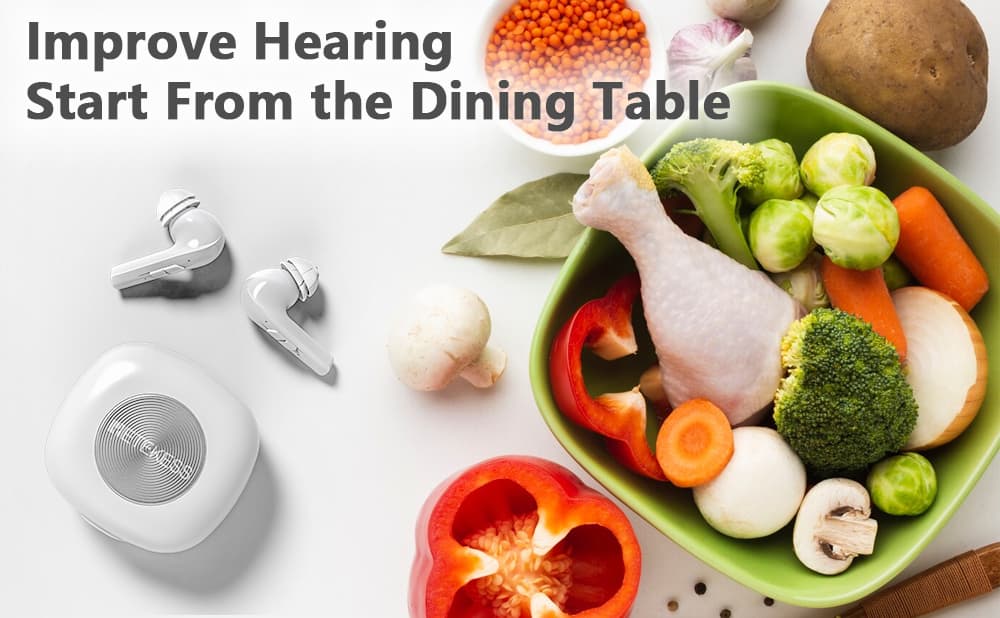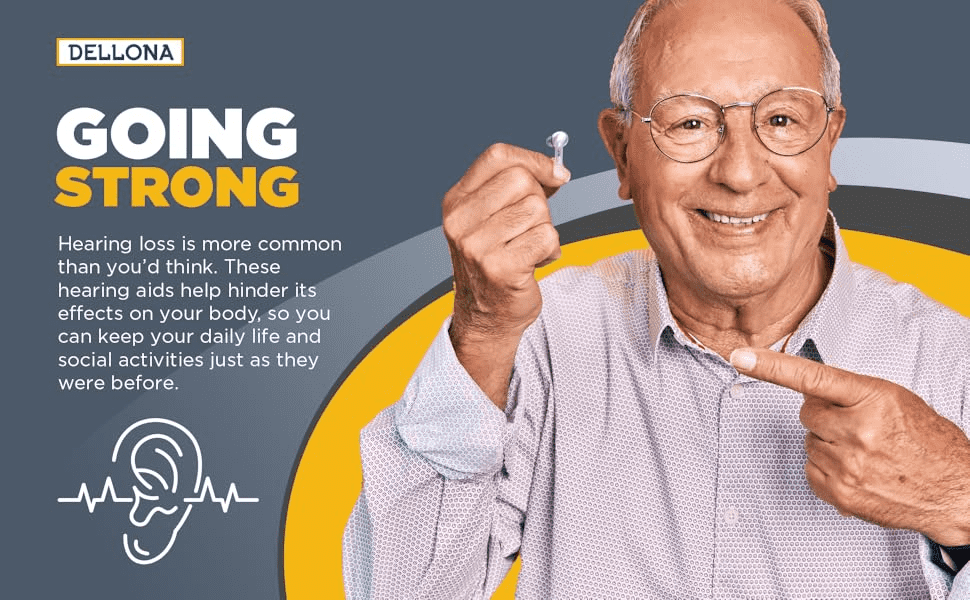Improve Hearing, Start From the Dining Table

Improve Hearing, Start From the Dining Table
- Amy
- hearing loss, eating healthy, otc hearing aids, professional hearing aids, affordable hearing aids, hearing care
We all know that hearing loss is a troublesome thing, but did you know that in addition to regular check-ups and paying attention to noise pollution, improving diet and lifestyle can also play a positive role in hearing?
Just like a machine needs fuel, our ears also need specific nutrients to protect auditory nerve cells and resist inflammation and damage.
Vitamin D: Vitamin D is like a "shield" for the auditory system. It can help keep the auditory nerve healthy and resist cochlear inflammation. Studies have shown that vitamin D deficiency is associated with hearing loss.
Foods rich in vitamin D include: salmon, tuna, eggs, mushrooms, fortified milk, etc.
Zinc: Zinc is like a "repairman" of the auditory system. It can promote the repair and regeneration of cochlear cells and help damaged cells restore function.
Foods rich in zinc include: oysters, beef, chicken, nuts, beans, etc.
Folic acid: Folic acid is like a "blood supplier" of the auditory system. It helps the synthesis of hemoglobin, ensures the blood supply of the cochlea, and allows auditory nerve cells to get sufficient oxygen and nutrients.
Foods rich in folic acid include: spinach, broccoli, kale, beans, etc.
Vitamin C: Vitamin C is like an "antioxidant warrior" of the auditory system. It can protect auditory nerve cells from damage by free radicals and maintain cell health.
Foods rich in vitamin C include: citrus fruits, strawberries, blueberries, etc.

Omega-3 fatty acids: Omega-3 fatty acids are like "inflammatory killers" of the auditory system. They can improve blood circulation, fight cochlear inflammation, and slow down the rate of hearing loss.
Foods rich in omega-3 fatty acids include: salmon, sardines, flax seeds, chia seeds, etc.
In addition to a balanced diet, the following lifestyle changes can also help improve hearing:
Reduce noise exposure: Noise is the main cause of hearing loss, just as noise pollution damages machines, noise can also damage our ears. Try to avoid long-term exposure to noisy environments, and wear earplugs or earmuffs to protect your ears.
Quit smoking: Smoking damages blood vessels, affects the blood supply to the cochlea, and accelerates hearing loss, just like clogging the pipes of a machine.
Control blood pressure and blood sugar: Both high blood pressure and diabetes damage blood vessels and increase the risk of hearing loss, just like aging machines and clogging pipes.
Exercise regularly: Exercise can improve blood circulation, increase oxygen supply to the cochlea, and protect hearing health, just like injecting vitality into a machine.
Get enough sleep: Lack of sleep can affect the recovery of the hearing nerve, just like overusing a machine requires rest.
Stay hydrated: Water can help remove earwax and keep the ear canal clean, just like cleaning the pipes of a machine.
Improving hearing requires long-term persistence. Diet and lifestyle changes are not achieved overnight, just like repairing a machine takes time, but as long as you persist, you will reap good results. Remember, prevention is better than cure. Starting today, pay attention to your hearing health and take positive measures to protect your ears and regain a clear world!
Note: This article provides general advice. If you have hearing problems, please consult a professional otolaryngologist.
Here are some more detailed suggestions to help you incorporate scientific diet into your daily life:
1. Recipe planning:
Eat foods rich in vitamin D at least twice a week, such as salmon, tuna, etc.
Choose foods rich in zinc, such as oysters, beef, etc., as your protein source.
Eat a variety of fresh vegetables every day, especially dark vegetables, such as spinach, broccoli, etc., which are rich in folic acid and vitamin C.
Incorporate fish rich in omega-3 fatty acids, such as salmon and sardines, into your diet at least once a week.
Supplements: Under the guidance of a doctor, you can consider taking some vitamin D and zinc supplements.
2. Cooking tips:
Healthy cooking methods such as steaming and boiling can reduce the intake of oil and salt.
Try to use fresh spices instead of salt, such as ginger, garlic, pepper, etc. to add flavor to food.
Add vegetables to soups, porridge, and stir-fry to increase nutrient intake.
Add some nuts and seeds, such as sunflower seeds and pumpkin seeds, to your snacks to increase zinc intake.
3. Lifestyle adjustments:
Regular work and rest: Maintain good sleeping habits and ensure 7-8 hours of sleep every day.
Moderate exercise: At least 3-5 times a week, each time for more than 30 minutes of exercise, such as jogging, swimming, yoga, etc.
Regular physical examinations: Go to the hospital for hearing examinations regularly to detect hearing problems early and treat them in time.

If hearing damage has already occurred, we should face it with a positive attitude and wear professional and scientific hearing aids.
For mild to moderate hearing loss, the clinical effect of wearing self-fitting otc hearing aids is comparable to that of doctor-fitted hearing aids.
Hearingsense 1 over-the-counter hearing aids provide FDA-cleared self-fitting hearing tests at the lowest price. The comprehensive functions of affordable hearing aids exceed the expectations of many users at the same price. It is easy to use out of the box, and the Bluetooth connection is very convenient, which is completely suitable for middle-aged and elderly people. 30-day free return is provided, so you can buy and wear without worry.
TWS hearing aids are equipped with Bluetooth streaming, support fine-tuning, 48-hour working time, use cheap prices, and provide a variety of high-quality functions.








